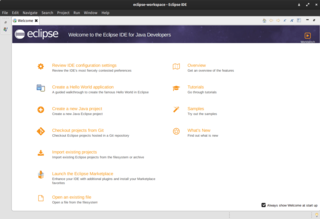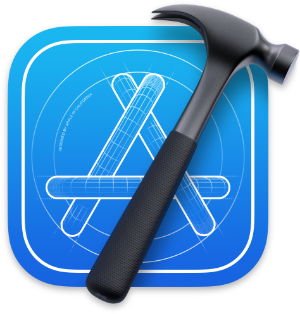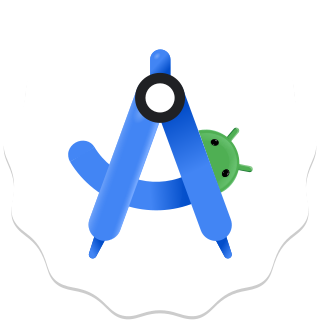In computing, cross-platform software is computer software that is designed to work in several computing platforms. Some cross-platform software requires a separate build for each platform, but some can be directly run on any platform without special preparation, being written in an interpreted language or compiled to portable bytecode for which the interpreters or run-time packages are common or standard components of all supported platforms.

Eclipse is an integrated development environment (IDE) used in computer programming. It contains a base workspace and an extensible plug-in system for customizing the environment. It is the second-most-popular IDE for Java development, and, until 2016, was the most popular. Eclipse is written mostly in Java and its primary use is for developing Java applications, but it may also be used to develop applications in other programming languages via plug-ins, including Ada, ABAP, C, C++, C#, Clojure, COBOL, D, Erlang, Fortran, Groovy, Haskell, HLASM, JavaScript, Julia, Lasso, Lua, NATURAL, Perl, PHP, PL/I, Prolog, Python, R, Rexx, Ruby, Rust, Scala, and Scheme. It can also be used to develop documents with LaTeX and packages for the software Mathematica. Development environments include the Eclipse Java development tools (JDT) for Java and Scala, Eclipse CDT for C/C++, and Eclipse PDT for PHP, among others.

Xcode is Apple's integrated development environment (IDE) for macOS, used to develop software for macOS, iOS, iPadOS, watchOS, tvOS, and visionOS. It was initially released in late 2003; the latest stable release is version 15, released on September 18, 2023, and is available free of charge via the Mac App Store and the Apple Developer website. Registered developers can also download preview releases and prior versions of the suite through the Apple Developer website. Xcode includes command-line tools that enable UNIX-style development via the Terminal app in macOS. They can also be downloaded and installed without the GUI.

IntelliJ IDEA is an integrated development environment (IDE) written in Java for developing computer software written in Java, Kotlin, Groovy, and other JVM-based languages. It is developed by JetBrains and is available as an Apache 2 Licensed community edition, and in a proprietary commercial edition. Both can be used for commercial development.

Adobe AIR is a cross-platform runtime system currently developed by Harman International, in collaboration with Adobe Inc., for building desktop applications and mobile applications, programmed using Adobe Animate, ActionScript, and optionally Apache Flex. It was originally released in 2008. The runtime supports installable applications on Windows, macOS, and mobile operating systems, including Android, iOS, and BlackBerry Tablet OS.

The Android SDK is a software development kit for the Android software ecosystem that includes a comprehensive set of development tools. These include a debugger, libraries, a handset emulator based on QEMU, documentation, sample code, and tutorials. The SDK is part of the official Android Studio IDE but its various tools and resources can be used independently.
Titanium SDK is an open-source framework that allows the creation of native mobile applications on platforms iOS and Android from a single JavaScript codebase. It is presently developed by non-profit software foundation TiDev, Inc.
Meme IDE is a software platform for developing mobile applications.
Dart is a programming language designed by Lars Bak and Kasper Lund and developed by Google. It can be used to develop web and mobile apps as well as server and desktop applications.

Android Studio is the official integrated development environment (IDE) for Google's Android operating system, built on JetBrains' IntelliJ IDEA software and designed specifically for Android development. It is available for download on Windows, macOS and Linux based operating systems. It is a replacement for the Eclipse Android Development Tools (E-ADT) as the primary IDE for native Android application development. Android Studio is licensed under the Apache license but it ships with some SDK updates that are under a non-free license, making it not open source.

Appcelerator is a privately held mobile technology company based in San Jose, California. Its main products are Titanium, an open-source software development kit for cross-platform mobile development, and the Appcelerator Platform.
HarmonyOS (HMOS) is a distributed operating system developed by Huawei for smartphones, tablets, smart TVs, smart watches, personal computers and other smart devices. It has a multi-kernel design with dual frameworks: the operating system selects suitable kernels from the abstraction layer in the case of devices that use diverse resources.
The version history of the HarmonyOS distributed operating system began with the public release of the HarmonyOS 1.0 for Honor Vision smart TVs on August 9, 2019. The first expanded commercial version of the Embedded, IoT AI, Edge computing based operating system, HarmonyOS 2.0, was released on June 2, 2021, for phones, tablets, smartwatches, smart speakers, routers, and internet of things. Beforehand, DevEco Studio, the HarmonyOS app development IDE, was released in September 2020 together with the HarmonyOS 2.0 Beta. HarmonyOS is developed by Huawei. New major releases are announced at the Huawei Developers Conference (HDC) in the fourth quarter of each year together with the first public beta version of the operating system's next major version. The next major stable version is then released in the third to fourth quarter of the following year.

OpenAtom OpenHarmony, abbreviated as OpenHarmony (OHOS) is a family of open-source distributed operating systems based on HarmonyOS derived from LiteOS, donated the L0-L2 branch source code by Huawei to the OpenAtom Foundation. Similar to HarmonyOS, the open-source distributed operating system is designed with a layered architecture, consisting of four layers from the bottom to the top: the kernel layer, system service layer, framework layer, and application layer. It is also an extensive collection of free software, which can be used as an operating system or in parts with other operating systems via Kernel Abstraction Layer subsystems.
The HarmonyOS App Pack or the App file, identified with the file extension ".app", serves as the file format used by the HarmonyOS operating system. It functions as a native HarmonyOS app for distribution and installation through Huawei AppGallery, or for distribution through Huawei Ability Gallery in respect of installation-free apps under both former classic dual-framework and current HarmonyOS NEXT system of unified OpenHarmony app framework. The App file is also used by a number of other open source HarmonyOS-based operating systems such as OpenHarmony and Oniro OS-based operating systems for distribution and installation of applications, video games and middleware. Including non OpenHarmony-based operating systems, such as GNU Linux-based Unity Operating System that supports the app file format.
HarmonyOS NEXT is a proprietary distributed operating system and an iteration of HarmonyOS, developed by Huawei to support only HarmonyOS native apps. The operating system is primarily aimed at software and hardware developers that deal directly with Huawei. It does not include Android's AOSP core and is incompatible with Android applications.
ArkUI is a declarative based user interface framework for building user interfaces on native HarmonyOS, OpenHarmony alongside Oniro OS applications developed by Huawei for the ArkTS and Cangjie programming language.
Ark Compiler, also known as ArkCompiler, is a unified compilation and runtime platform that supports joint compilation and running across programming languages and chip platforms, also operating systems of open-source OpenHarmony, Oniro OS, alongside proprietary HarmonyOS with single core system HarmonyOS NEXT included on native APP in Event-driven programming in a unified development environment and formerly built for Android-based EMUI for Huawei smartphones and tablets with HMS-enabled apk apps on AppGallery that improves app performance. It supports a variety of dynamic and static programming languages such as JS, TS, and ArkTS. It is the compilation and runtime base that enables OpenHarmony, Oniro OS alongside HarmonyOS NEXT to run on multiple device forms such as smart devices, mobile phones, PCs, tablets, TVs, automobiles, and wearables. ArkCompiler consists of two parts, compiler toolchain and runtime.
ArkTS is a high-level general-purpose, multi-paradigm, compiled, declarative programming language developed by Huawei which is a superset of open-source TypeScript, in turn a superset of JavaScript formerly used in July 2022 HarmonyOS 3.0 version, alongside its evolved percussor, extended TypeScript (eTS) built for HarmonyOS development as a shift towards Declarative programming. ArkTS compiles to machine code via its ahead-of-time compilation Ark Compiler. ArkTS was first released in September 30, 2021 on OpenHarmony, and the ArkTS toolchain has shipped in DevEco Studio since version 3.1, released in 2022. Since, OpenHarmony 4.0 release on October 26, 2023, ArkTS APIs has been added to the open source community to contribute.







